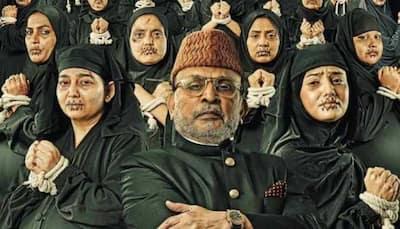
Bengaluru: In a decisive intervention aimed at maintaining communal harmony, the Karnataka government has invoked the Karnataka Cinema Regulations Act 1964, sections 15(1) and 15(5), to put a temporary halt to the release or broadcast of the much-anticipated film ‘Hamare Baarah’. The movie, which explores the pressing social issue of overpopulation, had a nationwide release date set for June 7, 2024, but will now remain on hold in the state for two weeks or until further notice.
The decision stems from serious concerns raised by the state authorities about potential communal tensions that the film might incite. These apprehensions were fueled by requests and petitions from various minority organizations and religious community activists who directly challenged the film’s release after watching its trailer.
‘The state government made this decisive move after extensive deliberations and careful examination of the presented concerns,’ a senior official revealed.
The prohibition has been an unwelcome surprise for the film’s producers who have invested substantial time and resources into its creation. The stay has cast a shadow over their significant efforts in production and distribution.
“The trailer had already caught the attention of many, and the themes of the film were starting to spark needed discussions about overpopulation,” said one of the producers. “We are disheartened by this pause, especially as the movie was designed to shed light on a critical issue through a bold narrative,” he added.
Jointly produced by Birender Bhagat, Ravi S. Gupta, Sanjay Nagpal, and Sheo Balak Singh, and directed by Kamal Chandra, ‘Hamare Baarah’ stars seasoned actors like Annu Kapoor, Manoj Joshi, and Paritosh Tripathi. The film was set to captivate audiences across the nation, promising a compelling storyline that delves into societal challenges often ignored.
The sudden suspension has also raised debates about the freedom of expression in cinema and the role of government intervention in artistic portrayals. Supporters of the ban argue that the content has the potential to exacerbate existing communal frictions, while critics worry about the implications for creative liberties.
A fan, visibly upset about the delay, stated, “Cinema has always been a medium to reflect society’s issues. Banning a film only stifles conversation instead of addressing the root problems.
.”
Karnataka is no stranger to such controversies. The state has had a history of clamping down on movies and literature that are perceived to threaten social harmony. This move reiterates the government’s vigilance over content that could disrupt communal peace.
The movie’s theme of overpopulation, coupled with its daring approach to conveying the issues, resonated with many but also triggered alarm among conservative factions. These groups fear that the portrayal could lead to misinterpretations and inflame sentiments, especially among the more sensitive sections.
The film’s director, Kamal Chandra, expressed his disappointment but also emphasized trust in the constitutional channels to resolve the impasse. “We believe in the due process and hope that this suspension will be reviewed soon. Our intention with ‘Hamare Baarah’ was always to foster dialogue and understanding about real problems facing our society,” he remarked.
With the film industry keenly watching the developments, the producers and legal teams are exploring the possibility of appealing the state’s decision. “It’s imperative to ensure that art continues to stimulate conversation, even if it’s uncomfortable,” stressed Ravi S. Gupta, one of the producers.
As the dialogue around ‘Hamare Baarah’ unfolds, the incident underscores the delicate balance between maintaining societal peace and upholding the freedom of creative expression. The tension between these ideals continues to shape the cultural landscape, not just in Karnataka but across the country.
Movie aficionados and advocates for creative freedom keenly await the next steps, hoping that ‘Hamare Baarah’ will eventually find its way to theaters statewide. The story of its pause and potential unban will likely set an important precedent for future cinematic releases in a country that has always been rich in its storytelling traditions yet complex in its societal fabric.












